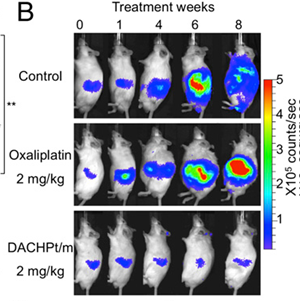Research Highlights
Vol.2, December 2014
Targeted therapy for pancreatic cancer in mice via nano-scale drug carriers
Increasingly effective drug-loaded nanocarriers, designed to deliver drugs directly to the source of a disease in the body, have shown great promise in tests on grafted tumor models in the laboratory. However, these laboratory trials do not accurately represent the growth, development and microenvironment of cancerous tumors inside living organisms.
Now, Kazunori Kataoka and co-workers at the University of Tokyo, together with scientists across Japan, have successfully completed a study using drug-loaded nanocarriers to treat genetically engineered mice with pancreatic cancer.
The nanocarriers in this case were polymeric micelle structures – a polymer-metal sphere comprising a hydrophilic (water attracting) exterior with the drug carried safely inside a hydrophobic (water repelling) core. Micelles hold significant advantages for targeted drug therapy, because they are stable at small sizes, they accumulate in specific cells, and they stay intact in the bloodstream for a considerable time.
The researchers incorporated a new antitumor drug called DACHPt into the micelles, which is effective against several intractable cancer tumors (such as triple-negative breast cancer) and has few side effects for the patient. The resulting nanocarriers remain stable in the bloodstream with an induction period of 8 hours before starting drug release, allowing time for the micelles to accumulate in the tumors before the drug is released.
Kataoka and his team tested their new DACHPt-loaded micelles on mice, which had been genetically modified to develop bioluminescent pancreatic cancer tumors. The results showed significant accumulation of the micelles in the primary tumors, and that the targeted drug delivery limited the tumor growth, as well as reducing levels of metastasis (the spread of the cancer through the body). This significantly extended the survival of the mice with few side effects, and the team believe the therapy shows promise for prolonged chemotherapy cycles.
The team are continuing their research into the long-term use of DACHPt-loaded nanocarriers.
Reference and affiliations
Horacio Cabrala, Mami Murakamia, Hironori Hojob, Yasuko Teradac, Mitsunobu R. Kanod, Ung-il Chunga,b, Nobuhiro Nishiyama,e,* and Kazunori Kataokaa,b,f,* Targeted therapy of spontaneous murine pancreatic tumors by polymeric micelles prolongs survival and prevents peritoneal metastasis. PNAS June 2013 doi: 10.1073/pnas.1301348110
- a. Bioengineering and f. Materials Engineering, Graduate School of Engineering, University of Tokyo, Bunkyo-ku, Tokyo 113-8656, Japan
- b. Center for Disease Biology and Integrative Medicine, Graduate School of Medicine, University of Tokyo, Bunkyo-ku, Tokyo 113-0033, Japan;
- c. SPring 8, Japan Synchrotron Radiation Research Institute, Sayo-cho, Sayo-gun, Hyogo 679-5198, Japan;
- d. Department of Pharmaceutical Biomedicine, Graduate School of Medicine, Dentistry, and Pharmaceutical Sciences, Okayama University, Kita-ku, Okayama 700-8530, Japan;
- e. Polymer Chemistry Division, Chemical Resources Laboratory, Tokyo Institute of Technology, Midori-ku, Yokohama 226-8503, Japan
*corresponding authors, e-mail address:kataoka@bmw.t.u-tokyo.ac.jpor
nishiyama@res.titech.ac.jp
Figure:







